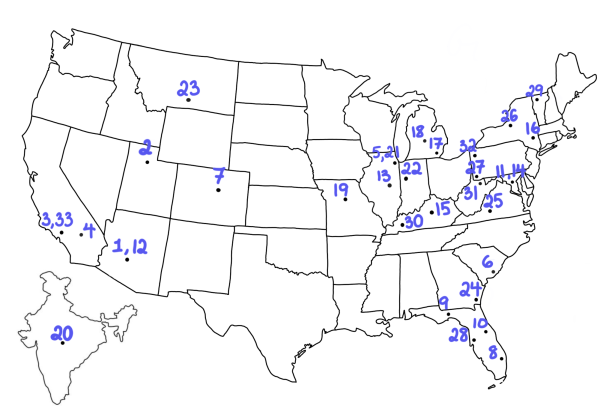Stress and Anxiety: Is High School Giving You Gray Hair?
Oftentimes, high school is a period of transition and increased responsibility in every student’s life. Academic courses can become more challenging, extra-curricular and social opportunities become more abundant, and teens often find themselves forced to plan ahead and prepare for their fast-approaching futures in the “real world.” The increasing complexity of a student’s everyday life can be a cause of tremendous stress and anxiety. For some, there just isn’t time enough in the day to attend to all of the responsibilities they’ve assigned themselves.
Though it is possible that stress and anxiety are caused by some of the same things, there are differences between them. Revere school psychologist Jennifer DeFago defined the two conditions and what sets them apart from one another.
“Stress is your brain’s response to a situation or demand, and could be experienced as frustration, nervousness, or any number of other ways. Anxiety can be one response to stress that involves worried, tense or fearful feelings. Anxiety is a symptom that can be a normal reaction to stress, but if it starts to interfere with daily living, then it may be more severe, and can cause a person significant distress,” DeFago said.
According to DeFago, stress can come from many things, such as routine activities, specific events, or changes in surrounding situations. Psychologist Dr. Sarita Bhakuni, PsyD, located in Chicago, explained the root and function of these conditions.
“Stress is functional, in that it can protect us, or enable us to act quickly. When people living before modern advancements had to deal with real dangers like large animals that could be predatory, our bodies naturally knew what to do. If you see a [threat], your body prepares you by activating your ‘fight or flight’ nervous system, and injects you with a burst of cortisol to give you energy. That hormone surges through your body and tells you ‘run’ or ‘fight’, and stress is a good thing in that case, because now you have the strength and activation to fight. Our body lets our mind know that something important or dangerous is happening, and we have to be alert. Anxiety, on the other hand, can keep us from acting, because some people become paralyzed and do not know what to do when they feel anxious. We know that having a little healthy anxiety [can] help push us toward actually doing [something], because there is a part of us that is really excited about the possibility that [it] could actually happen. Some anxiety can be healthy, but too much can hurt us; then it takes up too much of our energy, and distracts us from focusing on things where we can feel productive, smart and have fun,” Bhakuni said.
In a survey of 124 teenagers by the Palo Alto Medical Foundation, fifty-five percent of those participating identified school as their main cause of stress, signifying its commonness in high school settings. DeFago identified some causes of stress in a high school environment.
“There are many situations in high school that may cause temporary stress or anxiety. [These conditions] could be caused by any number of routine things that students participate in, such as academic work or extra-curricular [activities]. Social situations may cause stress as well. There could also be stress about some of the many changes that occur during high school,” DeFago said.
Bhakuni also acknowledged some of the stress-inducing feelings a high school student could experience.
“It is the time when you are getting to know yourself better — what you like and dislike about yourself and others. As a result, many of our insecurities creep in, because we are trying to figure out what other people like or dislike about us. We constantly are evaluating ourselves and being evaluated by others, so high school is a really stressful time. Also, teens put a lot of pressure on themselves to be the best at what they do and sometimes forget to just have fun. The stress and anxiety comes in about school performance and what will happen after high school if you do not perform well in school. [Additionally], parents want the best for their children, so they might put pressure on their kids because they want them to do well. Teens are also managing the stress or anxiety that comes with not wanting to disappoint people they care about,” Bhakuni said.
As technology’s advancement continues to evolve today’s society, it may also be increasing the effect stress has on the teenage population. Bhakuni spoke of the reasons behind the increasing prevalence of stress and anxiety among teenagers.
“One possible reason [for the increase] is because technology has made us believe that we can be more efficient, and therefore [we] should do more with less time. [However,] we also have to take time to connect with people, not gadgets, in order for us to feel like we mean something in the world, and can make an impact on others. [Also,] sometimes people prioritize things than in the long term don’t really matter that much,” Bhakuni said.
Both Bhukani and members of Revere High School’s counseling staff agree that while no particular grade level feels more stress than another, each one may face its own difficulties with stress. RHS guidance counselor Nick DePompei explained the different situations that students from each grade level could potentially find stressful.
“Ninth graders go through stress because of the transition to the high school. For sophomores and juniors, it might be [their] academics and teenage [relationship] issues. Seniors face transition stress as well: ‘what am I going to do with my life’, ‘where am I going to go to school’, ‘can I get into college’, and things like that,” DePompei said.
If the stress and/or anxiety a student is facing becomes unmanageable, serious problems could occur. Revere High School guidance counselor Linda Weigand spoke of the possible effects of stress and anxiety if left unchecked.
“I think that [if students are] not managing stress, it could develop into physical[ly] [and] emotional[ly] debilitating illnesses, [and] there are many different factors that can play into that,” Weigand said.
Like any condition, stress and anxiety do have certain indicators that one can look out for. Bhakuni identified some of the warning signs of stress and anxiety as feeling fatigued or cranky, being unusually antisocial, having trouble falling or staying asleep, changing your eating habits, having trouble concentrating and being hypersensitive of others’ opinions of you. She outlined some symptoms of stress and anxiety and, how they can become a problem for teenagers.
“Some signs of both [stress and anxiety are having a] rapid heartbeat, sweaty palms, [and] shortness of breath. Feeling out of control, [and] feeling like everything is going to go wrong… Some of these things we feel every day and are normal. They become a problem when they are interfering with your ability to take care of yourself and do what you need to do every day…Some people get really quiet and isolate themselves from people. Other people need to talk about it, so it is more obvious. Some people get angry, yell, cry and others laugh… We are all unique in our approach to stress and anxiety,” Bhakuni said.
There are several different ways to rid oneself of unnecessary stress. Bhakuni utilizes a method she calls the “30 rule,” where one who is feeling stressed or anxious thinks about the duration of their problems in increments of 30 minutes, 30 hours, 30 days, and 30 weeks. She explained how a student could use the technique to put stress in perspective, and how to limit stress whenever possible.
“The ‘30 rule’ helps us determine how much energy you give to something and whether thinking about it or worrying about it is productive. If [the problem will last] only 30 minutes or hours, sleep on it and you may feel better because it will be over soon. So don’t waste too much energy being stressed out or anxious about it. If the problem will last for 30 days, enlist the help of friends and family and make a plan to help you get through it. Activate your resources and plan to move forward. The hardest thing to do is to say no, and not take on too much, because at this age we want to be involved in everything, and want to be the best at many things. Sometimes we have to make difficult choices to say no to others and yes to ourselves so there is time to breathe and relax. So stop saying ‘yes’ all the time and think about what is really important to you,” Bhakuni said.
DeFago also voiced what to do when one is trying to manage too much stress or is struggling with anxiety.
“If there is any potential concern that the stress or anxiety could be more significant, I strongly urge a student to talk with an adult about concerns regarding a friend or themselves. For students experiencing any anxiety or who have friends experiencing any anxiety, it’s very important to ask for help and talk about the situation, and to know you do not need to work through the situation alone,” DeFago said.
As strange as it may seem, stress does have its positive effects on high school students. Bhakuni explained the benefit of some stress and/or anxiety in the lives of teenagers.
“A healthy amount of stress motivates us to work hard and be at our best. There needs to be a certain level of stress or anxiety to engage and be involved in something because it means that we care about it enough to prepare,” Bhakuni said.
Most students will probably face stress and anxiety in one form or another sometime in their four years of high school. The solution to managing these conditions lies within the teen’s knowledge of his or her personal limits and the perspective from which he or she views his or her different responsibilities. Students should find a balance between each day’s challenges and tasks, and remember to relax and have fun once in a while to keep stress and anxiety under control.






